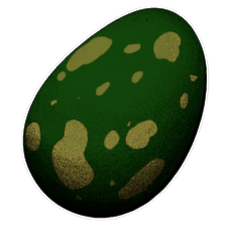Velonasaur Egg
cheat giveitem "Blueprint'/Game/Extinction/Dinos/Spindles/PrimalItemConsumable_Egg_Spindles.PrimalItemConsumable_Egg_Spindles'" 1 0 0Variant Fertilized Velonasaur Egg
cheat giveitem "Blueprint'/Game/Extinction/Dinos/Spindles/PrimalItemConsumable_Egg_Spindles_Fertilized.PrimalItemConsumable_Egg_Spindles_Fertilized'" 1 0 0Variant R-Velonasaur Egg
cheat giveitem "Blueprint'/Game/Genesis2/Dinos/BiomeVariants/DinoEggs/PrimalItemConsumable_Egg_Spindles_Gen2.PrimalItemConsumable_Egg_Spindles_Gen2'" 1 0 0Variant Fertilized R-Velonasaur Egg
cheat giveitem "Blueprint'/Game/Genesis2/Dinos/BiomeVariants/DinoEggs/PrimalItemConsumable_Egg_Spindles_Gen2_Fertilized.PrimalItemConsumable_Egg_Spindles_Gen2_Fertilized'" 1 0 0The Velonasaur Egg is one of the Eggs introduced in Extinction and also available on Genesis: Part 2.
Overview
Velonasaur Eggs are randomly dropped by ![]() Velonasaurs. They can be eaten or used to make
Velonasaurs. They can be eaten or used to make ![]() Regular Kibble for taming
Regular Kibble for taming ![]() Anglerfish,
Anglerfish, ![]() Ankylosaurus,
Ankylosaurus, ![]() Baryonyx,
Baryonyx, ![]() Beelzebufo,
Beelzebufo, ![]() Carbonemys,
Carbonemys, ![]() Carnotaurus,
Carnotaurus, ![]() Dimetrodon,
Dimetrodon, ![]() Diplodocus,
Diplodocus, ![]() Doedicurus,
Doedicurus, ![]() Gigantopithecus,
Gigantopithecus, ![]() Ichthyornis,
Ichthyornis, ![]() Kaprosuchus,
Kaprosuchus, ![]() Kentrosaurus,
Kentrosaurus, ![]() Lymantria,
Lymantria, ![]() Pelagornis,
Pelagornis, ![]() Pteranodon,
Pteranodon, ![]() Pulmonoscorpius,
Pulmonoscorpius, ![]() Purlovia,
Purlovia, ![]() Sabertooth,
Sabertooth, ![]() Sarco,
Sarco, ![]() Stegosaurus,
Stegosaurus, ![]() Terror Bird,
Terror Bird, ![]() Thorny Dragon, and
Thorny Dragon, and ![]() Velonasaur.
Velonasaur.
After two ![]() Velonasaurs mate, the resulting egg can be hatched into a baby
Velonasaurs mate, the resulting egg can be hatched into a baby ![]() Velonasaur.
Velonasaur.
Grabbing an egg in the presence of wild ![]() Velonasaurs will cause them to become hostile and attack the survivor.
Velonasaurs will cause them to become hostile and attack the survivor.
Incubation
The Velonasaur Egg takes 1h 8m 10.582s to hatch. It must be in the temperature range of 28 to 32 °C / 82 to 90 °F to successfully hatch, otherwise it will start to lose ![]() Health. The female
Health. The female ![]() Velonasaur needs between 18h and 2d before having the capacity to lay eggs again. The incubation time can be reduced by up to 20% if the egg is placed in an
Velonasaur needs between 18h and 2d before having the capacity to lay eggs again. The incubation time can be reduced by up to 20% if the egg is placed in an ![]() Egg Incubator at the ideal temperature.
Egg Incubator at the ideal temperature.
Changelog
| Patch | |
|---|---|
| 285.104 | Velonasaur Egg is added to the game. |

